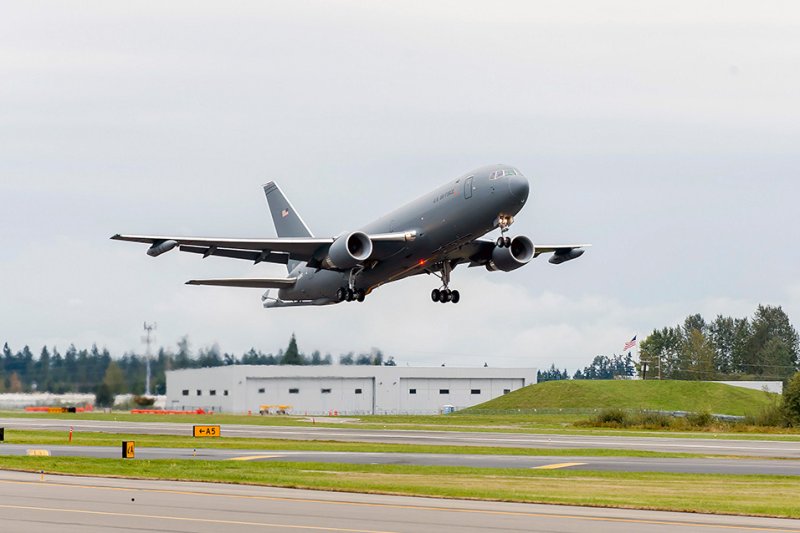The first KC-46 tanker aircraft were delivered to the U.S. Air Force in late January, and the Air Force expected to accept three per month after that. But since foreign object debris have been found in all of the delivered aircraft, they're barely receiving one per month. Photo courtesy of Boeing
June 18 (UPI) -- As the U.S. Air Force continues to find foreign objects in its new KC-46A Pegasus in-flight refueling tankers, a "fix" is months away, the branch's acquisition leader said.
Tools, rubbish and left-over parts, including loose nuts, are still being discovered since Boeing first delivered the refuelers in January and revamped its inspection process.
"It's a cultural issue," Will Roper, assistant secretary of the Air Force for acquisition, technology and logistics, told reporters Monday at the Paris Air Show in Le Bourget. "We are having those cultural dialogues with Boeing. This is not something you fix by sending out a memo, and then there's no foreign object debris in the airplanes."
Though Roper said at the briefing that he is "happy with Boeing's leadership and their response to FOD," he acknowledged the debris issue is likely to stick around for months or longer "because culture does not fix easy."
As Roper spoke, Boeing parked a gray KC-46 on the flight line nearby.
When the first debris was found in February, the Air Force stopped accepting the planes from Boeing until its inspection process was changed. Deliveries resumed in March but were halted again when inspectors found more debris.
Roper said the Air Force is accepting "one and change" KC-46s per month instead of the preferred three monthly. So far, Boeing has delivered 11 of the aircraft this year.
"Boeing is focused on providing quality KC-46 aircraft to our air force customer, and remain committed to our goal of 36 deliveries by the end of the year," Boeing said.
Roper said the inspection process is tedious and time consuming, with each airframe inspected from "tip to tail," with the inspection restarted every time something is found until the plane is clean.
Even before they arrive at Air Force bases, foreign objects have been found inside dozens of tankers in various states of assembly at Boeing's plant in Everett, Wash.
"We expect all of them are going to have foreign object debris," or FOD, Roper said. "As we go through and we're doing sweeps, we're finding FOD in the planes."
This is "unacceptable," Leanne Caret, the CEO of Boeing Defense, Space and Security, said Monday. "Our customers deserve better than that. I have personally apologized to our customers and I have given them my personal assurances ... in every aspect of our business, this will not happen again."
Company executives are examining the inspection process of other projects, as well.
Boeing CFO Greg Smith the company has been focused on figuring out what the company needs to do to fix the FOD problem, but Roper said he expects more KC-46s with debris in them for the time being.
"As those airplanes flow forward down the line, we think it's going to take some time for the new quality assurance inspection processes to start early enough so that airplanes will flow that are FOD-free," he said. "It's not the way we want to get airplanes into the Air Force, but it's what we're going to have to do in the meantime."
He added that the process won't be sped up because pushing for a faster delivery schedule "would put the rigor of the inspection at risk. We're just going to have to stay focused."
The KC-46 is built as an empty 767 airframe in Everett, Wash., then transferred to a facility at the south end of Paine Field called the Military Delivery Center. That's where the aircraft's military systems, including the refueling and communications equipment, are installed.
Although the plane has had inspection problems, Boeing officials said it is a safe plane and weren't embarrassed to bring one to Paris.
"KC-46 is a great capability," acting Air Force Secretary Matt Donovan said Monday. "It really is a great airplane. What we're talking about here are sort of minor things when you take a look at the whole capability of the airplane."
The KC-46 is not Boeing's only headache right now, as it has also been dealing with the global grounding of the 737 Max, which is believed to have faulty flight control software responsible for two crashes that killed 346 people.
The 737 Max and KC46 are manufactured in different factories in the Seattle area.















